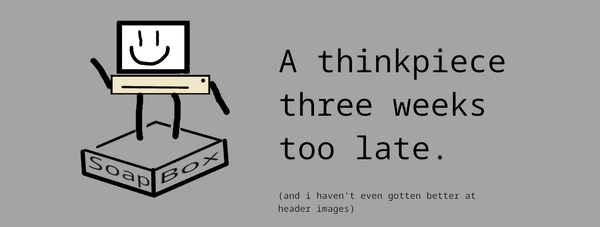Synonyms: Kindle and Unlimited
Looking to de-Kindle a bit? Here are some ideas.

Synonyms is a new post series I'm working on to help folks identify alternatives to the Big Tech platforms they may want to switch away from but feel stuck with.
Of course, there are plenty of these guides and lists already. So why one more? I find many of the existing lists either focus on "ethically pure" but impractical solutions ("don't like gmail - here's how to run your own mailserver") or focus only on entirely practical equivalents that may not address the underlying motivation ("don't like spotify - try youtube music"). I intend and hope to walk that line with a bit more nuance.
Bluesky seems to think I'm way into books.
Presumably because when I first joined I followed a few authors and then didn't do literally anything else for 9 months. When I did start reading my Discovery feed months later, it was full of authors talking about the process and business of writing and of readers having the most incomprehensible discussions. Because I haven't been active on mainstream social media since 2020, many of the topics, discussions, and ways of interacting with and speaking about the hobby were foreign to me.
Since I've become more active on bsky - posting about video games and technology and its place in society - the algorithm has chilled a bit on the #booksky stuff. But it's still there in the background radiation because I do legitimately love books and reading.
In my scrolling, I occasionally see people chatting about Kindle and Kindle Unlimited. Some people love and swear by Kindle Unlimited and all of their favorite authors are on there and they're perfectly happy with it.
If that's you: great, I'm not here to tell you how to live. Feel free to read the rest of this if you're curious about what else is out there, but otherwise I won't be upset if you close this tab. But if you're trying to reduce the amount of money you send to Amazon for any of Myriad Reasons, maybe it's worth spending some of your reading time on this post.
The first thing to get out of the way is this: none of the below-mentioned alternatives are going to be cheaper and more convenient and have more content than something like Kindle Unlimited.
That's the unfortunate truth of any of these types of discussions. Amazon has the money, scale, and user-base to ensure that they can offer the cheapest, most convenient, and most most for the reader. Authors and publishers won't always see this as their ideal solution, but even then if it's where the readers are what else are they to do?
Indeed I've seen some readers try to cope with this reality in some interesting ways. The rumor is that if you read more than 12 books on Kindle Unlimited in a month, Amazon loses money on you. So I've seen people recommending a "lean in" to Kindle Unlimited to stick it to Amazon. Read all of your books there plus when you're watching TV just open up a book you don't care about and scroll as quickly as possible through it.
I don't know if this rumor is true or not, and honestly it doesn't matter to me so let's pretend it is true. Let's say you are costing Amazon a few dollars a month if you're a particularly, uh, productive reader. At best what you're doing is sustaining or increasing the gravity of the Kindle ecosystem. Look at all these monthly active users and how damn active they are! Don't you want to list your book here? And at worst you're continuing to give Amazon your money and denying it to (potentially more ethical) alternatives.
Even if you are "costing them money" and getting indie authors paid out by constant blind scrolling, Amazon has plenty in reserve to continue to wait it out until all tenable alternatives are no longer tenable. They spent years burning cash on free shipping and no-questions returns to strangle the competition in physical goods. Why would they care about some book nerds over-consuming on their platform, especially when the majority of their users are probably under-consuming?
Anyway, I promised no judgement so let me end my rant there. It just seemed important to point out upfront.
Let's talk about some of the alternatives out there for getting your paper book, ebook, and audiobook fixes.
Your Local Library and the Libby App
| Formats | Subscription | DRM |
|---|---|---|
| Varies (physical, ebook, audiobook) | N/A (kinda?) | Yes |
You knew this was coming sooner or later, so why not put it right up front?
Plenty of people much more informed, passionate, and eloquent than me can talk about how libraries are an important pillar of any functional community and you should support yours even if that only means getting a library card and never using it.
But, we're here to talk about books. And Book = Library, right?
In addition to physical books, many libraries (in the US) offer ebooks and audiobooks via the Libby app these days. To be sure, it's no Kindle Unlimited. Just like with physical books, you are constrained by the number of copies of the ebook or audiobook your library network is licensed to use so you may need to place a Hold and wait a bit if it's a new and popular book.
I'm currently estimated to be 23 weeks out from being able to borrow the new Stormlight Archives ebook, though there are a few physical copies available in my network that I could get shipped to my local branch if I wanted. Not that I could reasonably finish the book in the time allotted for any library loan, anyway.
To be clear, Libby isn't just a phone app. For those who like to read on ereaders, Kindle and Kobo (which we'll talk about a bit more later) are both generally supported. As are Android-based ereaders like Boox where you can just install the app.
Managing holds and transfers and loan durations can offer a bit of an overhead, so you may not be able to do all of your reading with library books if you are looking for very particular and very popular books, but why not dip into the catalogue now and then and pick up a book or two?
Local Book Stores
| Formats | Subscription | DRM |
|---|---|---|
| Physical | Probably Not | N/A |
Here's the other gimme. Support your local indie bookshops where you can and where you have them. I don't think that's a controversial statement.
But you don't necessarily have unlimited space for physical books, don't want to have to bother with second-hand trade-ins all the time, or just prefer ebooks or digital audiobooks. We'll talk about different ways to continue to support local businesses even a little bit when consuming digitally.
Kobo or Nook Ecosystems
| Formats | Subscription | DRM |
|---|---|---|
| ebook, audiobook | Kobo yes, Nook no | Mostly* |
* Kobo offers Adobe-DRM downloads as well as DRM-free downloads where available, though there is no search filter to identify DRM-free content before purchase. I haven't checked B&N or Nook.
I'm not here to tell you that you need to exclusively get your books from your local library and indie book stores. There are a couple of other Kindle-esque ebook ecosystems you can use instead.
Barnes & Noble is still surviving and indeed thriving. They've got some pretty big expansion plans for 2025. And they've got their Nook devices and digital ecosystem there for you ebook fans. Despite weird incorrect information on search engines, Nook does not seem to offer a subscription service.
For my part, I use Kobo. They offer several models of ereader, they sell refurbished units when available, and they partnered with iFixit to offer parts and repair guides for newer models, which I think is great.
Kobo offers the Kobo Plus subscription. I subscribed to it for a couple of months. I never subscribed to Kindle Unlimited, so I don't know how it compares to that, but the content selection was okay-but-not-great. I read a few books from it, but eventually I wanted to read some books not available on the subscription and found myself paying for it but not using it so I cancelled it. Your mileage may of course vary.
Kobo also, at one point, offered a "support your local bookstore" situation where some (small) percentage of your ebook sales would be directed to a local bookstore you've chosen. My local bookstore still offers a button that claims to link your account and it causes a "Welcome [bookstore] customer!" banner on the Kobo website for me, but I can't find any information about what it actually does these days.
Bookshop.org, ebooks.com
| Formats | Subscription | DRM |
|---|---|---|
| Varies (physical, ebook) | No | Varies* |
* ebooks.com offers a specific "DRM-free" filter in their search. It doesn't seem like you can actually download ebook files from bookshop.org, so yeah.
ebooks.com is a classic. I remember buying my very first ebook from them long ago (though I can't remember what and no longer have access to the account). They don't integrate directly with any ereaders that I'm aware of, nor do they have any first-party software or apps (other than their website) to read the books on. But they offer basic instructions for syncing the books with compatible reader devices. They do offer a specific "DRM-free" filter in their search to help you find books you'll more easily be able to use on your devices, which is a nice touch, but honestly I'm not sure I'll be returning here any time soon.
bookshop.org is the new(er) kid on the block. They offer physical books and recently started offering ebooks as well. They partner with local book stores to provide them a sizable portion of profits from sales. For ebooks, they offer an android and iphone app for reading (including android-based ereaders), or you can read them in a web browser. Social media is abuzz with rumors of an upcoming Kobo integration. Which would be neat, but I'm not really holding my breath. Since the ebook service is newish, they don't have a great selection, but they say they're continually onboarding new publishers and will be improving their ebook library to rival their physical book one. The local bookstore support might be enough to get me to switch if they can manage a Kobo integration for me.
Wrap-up
And that's not even everything. There are a few smaller options for specific use-cases that I'm not gonna cover here - specialty shops and publishers with their own stores, humble bundles, etc.
Amazon and Kindle offer a pretty sticky ecosystem (to be sure things like Kobo and Nook do as well), but you can see it's not everything. There are options out there were you can sort of mix and match and fine what works for you.
We all have our priorities and draw our own lines on what's important to us, but if you're trying to reduce your Amazon dependence, maybe you can start to poke your head out with some of these options and see how it feels.



![A poorly-drawn cartoon computer with a happy face on the monitor stands next to text: "Don't say tariffs [x4]...oops"](/content/images/size/w600/2025/04/dontsaytariffs.png)
